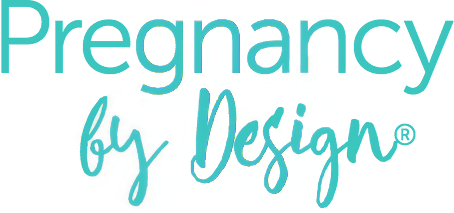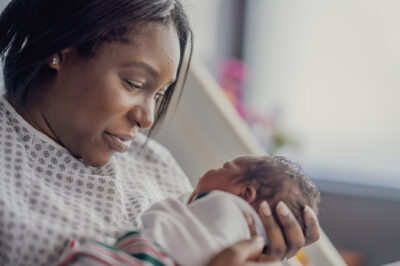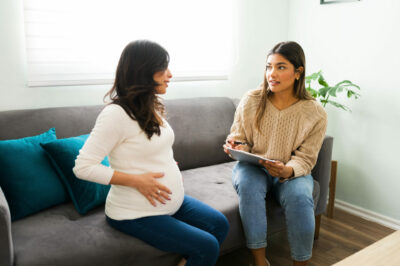First Trimester of Pregnancy: Weeks 1 through 13 of Pregnancy
A normal pregnancy lasts for approximately 40 weeks and is broken into three parts, called trimesters. The 1st trimester of pregnancy starts on the first day of your last menstrual period and lasts through 13 weeks.
The second trimester begins on week 14 and lasts until the end of week 27. The third trimester begins on week 28 and lasts through week 40+.
Many normal pregnancies go beyond 40 weeks and, depending on your provider, you may deliver your baby up until 42 weeks.
By the time you take a pregnancy test you will probably already be several weeks into your 1st trimester of pregnancy and have experienced some early signs of pregnancy. A pregnancy test measures your HCG hormone (human chorionic gonadotropin) by blood or urine. You may have a positive pregnancy test before you notice any signs that you are pregnant!
Changes to Your Body
What Does it Feel like to be Pregnant in the First Trimester of Pregnancy?
Everyone is different. Some women experience very minimal body changes while others experience many body changes and symptoms in their first trimester.
Some of the Most Common Early Pregnancy Symptoms Include:
- Feeling more tired than usual
- Morning sickness (here is a post on morning sickness and helpful remedies)
- Food aversions
- Tender, sore breasts
- Mood swings (may feel like a roller coaster of emotions – these mood swings are due to pregnancy hormonal changes)
- More frequent urination
- Heartburn (due to hormonal changes but you may not experience heartburn until later in pregnancy)
- Constipation (having trouble going to the bathroom)
- Weight gain or loss
- Very light bleeding (known as implantation bleeding – when the fertilized egg attaches to the lining of your uterus). About 1 out of 3 women experience this
- Period like cramps
It’s important to listen to your body and rest when you feel tired. You may need to make changes such as going to bed a little earlier than you usually would. If you are struggling with morning sickness, you may want to try eating smaller and more frequent meals.
The good news is that most women begin to regain energy and feel better as they reach the end of the first trimester of pregnancy and head into the second trimester.
Here is a complete list of early signs and symptoms of pregnancy symptoms
Call Your Healthcare Provider Right Away, if You Experience Any of the Following
- A fever 100.4 degrees Fahrenheit or higher
- Heavy vaginal bleeding (filling a period pad in an hour)
- Severe cramping or stomach pain
- Vomiting and/or diarrhea for more than 24 hours
- Feeling faint or dizzy
- Pain or burning when peeing
- Any unusual vaginal discharge
- Sudden swelling of hands, fingers, ankles or face
- Blurry vision or seeing spots before your eyes
- Severe headaches
- Pain or cramping in your arms, legs, or chest
Most importantly, trust your instincts. If you feel something is wrong call your health care provider.
What Changes are Happening Week by Week With My Baby in the 1st Trimester of Pregnancy?
A lot of changes happen in the 1st trimester of pregnancy for both you and your growing baby’s development. Here are some of the changes that will take place over the next 12 weeks.
Pregnancy Week 1-2:
This period of time is known as conception, when the fertilized egg and travels through the fallopian tube and embeds itself into the lining of the uterus.
Pregnancy Week 3:
During the third week, the baby (known as the embryo at this stage) has begun to develop the brain, spinal cord, heart and gastrointestinal tract.
Pregnancy Weeks 4-5:
Baby is the Size of a Poppy Seed

Your baby is still very small but big changes are underway.
- Your baby’s vital organs have already begun to form including the heart, brain, lungs, ears and eyes!
- Baby’s neural tube will close by the end of the week, and the brain and spinal cord will start to develop.
- The heart has begun to beat steadily.
- Arm and leg buds are visible
- The ear and eye structures have begun forming
- The placenta has begun to form and produce hormones including hCG (it is around this time that you may begin to experience morning sickness due to pregnancy hormones)
- Your baby is now about a ¼ inch long by the end of week 5
What’s Happening with You
This it the time when many women learn they are pregnant. Four weeks is the earliest possible positive pregnancy test. Your body has been making hCG (human chorionic gonadotropin), but maybe not enough to show up in the urine for a positive test. For some women, it may take 2-3 weeks after a missed period before there is a detectable hCG level. Baby is in the uterus and implanted in the uterine lining.
Your pregnancy is generally calculated from the first date of your last menstrual period (LMP).
If you aren’t already taken a prenatal vitamin, you should begin taking one now. Be sure that you are getting 600 micrograms of folate or folic acid which greatly reduces your baby’s chance of a developing a serious neural tube defect.
Pregnancy Weeks 6-7:
Baby is the Size of a Pea

- Tiny little pea of a person has blood circulating and the beginnings of arms and legs.
- By now, baby is covered with a thin layer of see-through skin.
- Hand and feet buds are forming (currently webbed and will later become fingers and toes)
- Your baby’s lungs, nose, jaw and palate have begun forming
- The baby’s brain continues to develop into complex parts
- Small impressions on the side of the head will become baby’s ears. Y
- Your baby’s heartbeat can be detected with ultrasound at about 6 weeks and on a doppler at 8-10 weeks
- Your baby is now about ½ inch long
What’s Happening with You
Your body is growing a baby and a placenta, so take care of yourself. You may begin noticing changes in your breast, such as tenderness or swelling. You may also be experiencing heartburn, which is common during pregnancy. For heartburn, try eating smaller meals and having beverages separate from your meals. You may also try taking a tablespoon of organic or raw apple cider vinegar (take it with honey or dilute in water and drink)– while it sounds counter-productive many women have found it to be very helpful in minimizing heartburn.
Your provider should be able to find baby’s heartbeat on a doppler or vaginal ultrasound sometime in the next couple weeks.
Pregnancy Week 8:
Baby is the Size of a Raspberry

- At week 8, the baby has every part that is present in an adult
- By this time all of your baby’s organs are present and most are functioning!
- The irises of baby’s eyes are developing.
- Your baby can even curl his fingers around an object!
- Baby also hiccups, has tastebuds on his tongue and toothbuds in his gums.
- Eyelids have formed
- The baby’s genitals have begun to form
- Baby’s ears are continuing to form (both internally and externally) and bones are growing and hardening.
- Baby’s a bit of a lima bean (one centimeter long) and has a nose and eyes in the right place!
What’s Happening with You
Usually 8 weeks is the earliest that most providers will see you for first prenatal visit. Learn more on what to expect at your first prenatal visit.
You may not have a belly at all yet, but your breasts are probably feeling it. This is also a big time for “morning” sickness.
Pregnancy Weeks 9-10:
Baby is the Size of a Key Lime.

- Baby’s hair is beginning to grow all while her brain is rapidly forming.
- Baby can now bend her elbows and eyelids and external ears continue to develop.
- Your umbilical cord is also now clearly visible.
What’s Happening with You
You’ve got a lot higher blood volume, so be careful as you learn how that affects you. At some point in pregnancy you may experience dizziness, swelling, fatigue, blood vessel changes, and other side effects of all the extra blood. An increase in the hormones hCG and progesterone may be keeping you up a night.
But there is good news! You are only one month away from the 2nd trimester when pregnancy symptoms like nausea and extreme fatigue begin to fade.
Pregnancy Weeks 11-12:
Baby is the Size of a Plum.

- By the end of week 12, your baby will weigh about 1 ounce and 3 inches long.
- Your baby is starting to move even though you likely you can’t feel anything yet.
- Baby’s bone marrow has begun making white blood cells
- Vocal cords are forming and the pituitary gland has begun secreting hormones.
What’s Happening with You
You’re wrapping up the 1st trimester at the end of this week and you may start to see the beginnings of a baby bump. Hopefully your morning sickness is starting to go away as you head into the second trimester.
When Should I Go For My First Prenatal Visit?
Usually your health care provider will want to see you for your first prenatal care visit between 8-10 weeks after your last period.
Birth providers usually wait to see you until this time so you will be able to hear your baby’s heart beating on a Doppler or ultrasound.
Not sure if you should go with an OB-GYN or a Midwife? Here is a post on the different types of pregnancy health care providers.
You may also want to check out our free Guide to Writing a Birth Plan
During Your First Prenatal Visit, Your Health Care Provider Will Likely:
- Confirm your pregnancy (either through a urine test or by baby’s heartbeat on doppler or ultrasound)
- Calculate your due date (if you are able, be read to answer when your last monthly period occurred)
- Ask you about your medical history
- Take your blood pressure, weight and height measurements
- Talk with you about prenatal nutrition and prenatal vitamins
- Discuss things relating to your lifestyle (exercise, stress, alcohol use etc.)
- Do prenatal blood tests in order to determine:
- Blood type
- Complete blood count (CBS)
- Rh (Rhesus) factor,
- If you have any diseases such as HIV, hepatitis B & C, and any sexually transmitted infections (STIs), Tuberculosis (TB) and rubella
- A urine culture will also be taken
- Physical exam
- Talk with you about screening tests and genetic testing options for Down syndrome, cystic fibrosis and other birth defects and chromosomal issues
Here is a post on everything you can expect at your first prenatal visit.
Things You Should AVOID During Pregnancy
Alcohol and Drugs
Alcohol interferes with the normal growth of a developing fetus and can result in birth defects. Women who drink heavily throughout pregnancy are more at risk for having a baby with fetal alcohol syndrome (FAS). FAS can affect a baby’s growth, intellect, behavior and cause abnormal facial features. Alcohol related defects can also occur even when alcohol is consumed in smaller amounts. No amount of alcohol is considered safe during pregnancy. If you are struggling to stop drinking talk to your midwife or doctor or you can visit Alcoholics Anonymous to find local resources.
According to ACOG, about 1 out of every 20 women use illegal drugs during pregnancy. Drugs including methamphetamines, heroin, cocaine, cannabis, or prescription drugs taken for nonmedical reasons increase you and your baby’s risk of health problems and should be avoided during pregnancy. In early pregnancy, drug use can cause birth defects and miscarriage and can interfere with the baby’s growth, cause preterm birth and fetal death in later pregnancy. It’s very important that you talk to your health care provider if you are taking illegal drugs. The more they know, the more they can help you get the right support you need. You can also find resources on Narcotics Anonymous.
Smoking and Secondhand Smoke
According to the American College of Obstetricians and Gynecologists, women who smoke during pregnancy are more likely to have babies that are born too early and may not be fully developed (preterm birth). They are also more likely to have babies with colic (uncontrollable crying) and babies born to smokers are at a greater risk of SIDS (sudden infant death syndrome). Cigarette smoke, exposes unborn babies to many harmful chemicals (about 4000 chemicals) and can damage their organs, sometimes permanently.Electronic cigarettes (or e cigarettes) contain nicotine and are not a safe substitute for cigarettes – they should be avoided during pregnancy. It’s a good idea to quit smoking and to avoid secondhand smoke as early in your pregnancy as possible. If you are struggling to quit smoking, speak with your healthcare provider or call 1-800-QUIT-NOW.
Dieting or ‘Eating for Two’
Pregnancy is the perfect time to focus on eating as healthy as possible. Your food choices during pregnancy are essential to having a healthy pregnancy and having a healthy baby. (And it’s ideal, if you are able to begin eating healthy before you get pregnant). Here is a post on the best foods to eat during pregnancy. Make sure to discuss your individual nutritional needs with your health care provider.
It’s important to avoid dieting during pregnancy because cutting out certain foods may deprive your baby of important nutrients. Women who don’t gain enough weight during pregnancy are more likely to have babies with greater risk for problems such as premature birth, which can cause lung and heart problems. Here is a post which provides more information on how much weight to gain during pregnancy.
On the flip side, there is a common myth that pregnant can eat whatever they like during pregnancy because they are ‘eating for two.’ The truth is that while your nutrient needs increase during pregnancy, you actually only require an extra 300 calories per day in the second and third trimester of pregnancy. During the first trimester you do not need any additional calories.
Caffeine
When you become pregnant, you should pay closer attention to how much caffeine you have each day. Caffeine is found in coffee, tea, chocolate, soda and even in some over-the-counter medications.
One study from the American Journal of Obstetrics and Gynecology found that women who have 200mg or more of caffeine each day are 2x’s more likely to have a miscarriage than those who don’t have any. Yet another study from Epidemiology found no increased risk in women who drank a minimal amount of coffee each day (between 200-350 mg per day.) Because of these differing results, the March of Dimes recommends that pregnant women limit caffeine to less than 200 mg each day (about a 12-ounce cup of coffee).
BPA
Short for bisphenol A, BPA is an industrial chemical that is used to make plastics, such as food and drink containers like water bottles and food cans. BPA is a concern because, according to the National Center for Health Research there is evidence linking it to an increased risk of heart disease, diabetes, obesity, sexual dysfunction, and behavior problems in children.
While the FDA has said that BPA is safe at very low levels, they have also stated that “recent studies provide reason for some concern about the potential effects of BPA on the brain, behavior, and prostate gland of fetuses, infants, and children.”
Tips for Avoiding BPA
- Look for BPA-free products on package labels.
- Limit canned food purchases. Most cans are lined with BPA.
- Do no reuse or heat plastics. Avoid microwaving plastic containers or running them through the dishwasher which may cause it to break down over time and leach BPA into your food or drink.
- Choose alternatives such as glass or stainless steel containers instead of plastic containers.
Things You Should Begin Doing During Your 1st Trimester of Pregnancy
Go For Regular Dental Checkups
Some women worry about having dental work done during pregnancy. Avoiding the dentist is a bad idea. Hormonal changes and an increase in blood flow during pregnancy may cause your gums to bleed and make you more prone to dental disease.
So it’s a really good idea to keep up with preventative dental care like cleanings and annual exams during pregnancy.
Recommendations for Dental Care During Pregnancy:
- Brush twice per day with a soft bristled toothbrush
- Floss gently at least once per day
- Rinse your mouth with water as often as possible.
Here are more tips for caring for your teeth during pregnancy
If you do not have dental insurance, don’t worry there are options:
Dental Clinics
Every state in the U.S. has a few low-cost and some no-cost dental clinics around. You can check your local public hospital or visit the American Dental Association website.
Dental Schools
Dental Schools are a great place to go for dental care because students are required to gain training and experience prior to getting their license. Care is not always free but it is usually very affordable. The downside is that you may have to spend extra time in the chair while the student works with a supervisor. Here is a list of dental schools.
Check with your Dentist
Many dentists nowadays offer their own financing or discount plans for uninsured patients. Others may work with you on a sliding scale.
Take a Prenatal Vitamin
Prenatal vitamins help you get your daily dose of vitamins and essential nutrients. This gives your baby access to the nutrients and helps your body be stronger during pregnancy. Plus some vitamins, like B6, may even help to lessen your morning sickness!
There are many high quality prenatal multivitamin brands available (as well as low quality brands). The best prenatal vitamins are food-based and tested by a third party. Ask your provider for recommendations, be sure to read the labels and the reviews, and choose one that looks best. Keep in mind that you can always switch brands.
Look for a Prenatal Vitamin that includes these vitamins and nutrients:
- Folate or Folic Acid
- Calcium
- Choline
- Vitamins A, B (Specifically B6 and B12), C, D & E
- Iron
- Zinc
- Iodine
- Copper
Here is a post with more information on choosing a prenatal vitamin
Exercise
Exercise can help prevent a number of pregnancy-related discomforts and ailments including lower back pain and gestational diabetes. Exercising during pregnancy can also help to regulate your mood, help position the baby, and prepare you for the intensity of labor. The recommended amount of physical activity for a pregnant woman is 30 minutes each day, 4 times per week.
Here is a post with safe exercises you can do during pregnancy.
Foods To Eat & Foods to Avoid
You’ve probably heard the expression “you are what you eat”. So it only makes sense that when you’re carrying a baby, your baby is eating what you eat as well. Following is a basic guide for foods you should be eating and those you should be avoiding.
Foods to Eat
You will want to aim to eat mostly “whole foods” during pregnancy. Whole foods are nutrient dense and minimally processed – this means they are as close to how they grew as possible. For instance, an apple is a whole food because it grew on a tree that way.
Do I have to eat Organic Foods? While eating organic food is a good idea, you don’t necessarily have to eat all organic food.If you’re going to buy some organic food, try to buy organic foods like peaches, grapes and apples that contain the most pesticide residue when they get to you. By contrast avocados, bananas, kiwi, pineapples and honeydew don’t carry much pesticide and are considered safer to eat non-organic. To see the full list of the Dirty 10 and Clean 15 you can visit EWG’s site.
What to Eat:
- Protein – aim for 75-100 grams per day
- Vegetables – try to eat a rainbow of fruits and vegetables in many colors each day and be sure to include dark leafy greens like Swiss chard, kale and spinach
- Healthy Fats – Olive oil, coconut and coconut oil, butter, avocado, nuts, seeds, and ghee are all examples of good fats. Try to get Omega-3 fatty acids into your diet as well – fish, flax seed, or a supplement are all good sources.
- Calcium – you can get iron from sources like fortified orange juice, dairy, salmon and spinach
- Folate or folic acid
- Iron
- Water! Be sure to drink plenty of water –you will want to drink half of your body weight in ounces each day. So for instance if you weigh 150 pounds, you will want to drink 75 ounces of water every day.
Read all about what to eat during pregnancy here
Foods to Avoid during Pregnancy
There are several foods that should be avoided during pregnancy such as any food that may contain the harmful bacteria such as listeria monocytogenes, Campylobacter and E. Coli. Food-borne illnesses can make anyone sick, but during pregnancy the risks involved with these bacteria have been known to cause serious health problems, miscarriage and stillbirth.
Foods that May Contain Harmful Bacteria and Should Be Avoided include:
- Certain dairy products like soft serve ice cream and unpasteurized (raw) milk
- Soft cheeses including brie, blue cheese, camembert, and feta cheese
- Raw or under-cooked meat
- Deli meats -you can heat them until steaming (160 degrees F) if you decide to eat them
- Raw eggs
- Unwashed produce
- Raw seafood (raw oysters, sushi)
- Raw sprouts
Avoid fish containing high levels of mercury including:
- Swordfish
- king mackerel
- Shark
- Tilefish
Avoid Foods with Artificial Dyes
Dyes found in food such as juices, soda, candy, salad dressings and even pickles should be avoided. Artificial dyes can cause chromosomal damage to your developing baby and can harm you as well. In fact, artificial dyes have been linked to behavioral issues, cancer and allergies. Check labels and avoid these dyes whenever possible:
- Blue 1
- Blue 2
- Green 3
- Red 3
- Red 40
- Yellow 5
- Yellow 6
Tips to Avoid Artificial Dyes
- Make sure to read the ingredient list on food labels
- Try and avoid processed foods – eat whole foods whenever possible
Be Mindful of Your Mental Well-Being
Many times the focus during pregnancy is on physical health but your mental health is equally as important. Mental health problems experienced in pregnancy can you at greater risk for postpartum mental health issues such as depression or anxiety. If you are struggling, it’s important to seek help.
Stress
Normal, everyday stress such as traffic or a deadline at work shouldn’t cause any problems during pregnancy. However, long lasting stress such as dealing with difficult relationship(s), or a death of a loved one may cause complications if not addressed.
When you’re put in a stressful situation, your body thinks it’s in danger and goes into what is known as “fight or flight” mode, which causes a surge of stress hormones. Ongoing or severe stress can trigger mental health issues including anxiety and depression, if not addressed.
Here is a post with more information on managing stress during pregnancy.
Will Stress Affect My Baby?
Yes it can. With short term stress, stress hormones eventually subside. However, when stress occurs on a regular basis, the body’s stress response system will continue releasing stress hormones. Stress isn’t good for pregnant women or their babies.
A field of science called epidemiology has shown us that the effects of stress teach our babies’ bodies how to deal with the type of environment they will be born into. Those being born into a high-stress environment may be at greater risk for stress-related health issues.
Read more about how you can influence the genes passed onto your baby.
Depression During Pregnancy
Depression is a considered a mood disorder that affects 1 in 4 women at some point during their lifetime. These disorders affect people of all different ages and background. There are many things to adjust to during pregnancy (between body changes, pregnancy symptoms, hormone fluctuations) so some degree of feeling overwhelmed or anxious is quite normal. For many expecting parents, these issues do not lead to diagnosable mental illness.
However there are a number of risk factors making some women more prone to depression or anxiety during pregnancy.
Depression Risk Factors Include:
- A prior family history of mental illness (genetics)
- Having a lack of support (these could include your partner, family and social network)
- Stressful events such as past abuse or trauma or death of a loved one may trigger the onset of depression
- An unplanned pregnancy
- Hormonal changes that happen during pregnancy or after childbirth (when depression happens after birth it is known as postpartum depression)
- An absence of biological mother
- Having had past conception/pregnancy complications
- A pre-existing illness or disorder—some can lead to and/or occur with depression including:
- Anxiety disorders
- Alcohol and drug problems
- Pelvic pain that has lasted a long time
Symptoms of Depression
According to the American College of Obstetricians and Gynecologists (ACOG) If you experience 5 of the 10 symptoms listed below for most of the day, every day, during the same 2-week period, you might have depression. And one of your symptoms must be either persistently sad mood or loss of interest in things that you once enjoyed.
- You feel persistently sad
- No longer interested in activities you used to enjoy
- You’ve experienced weight loss (while not dieting) or weight gain
- A decrease or increase in appetite
- You’ve had trouble sleeping or you’re sleeping too much
- Feelings of worthlessness or guilt
- Moving more slowly or moving more quickly than usual
- Fatigue or loss of energy
- Having trouble thinking, concentrating, or making decisions
- You have thoughts of death or suicide
Depression During Pregnancy Affects Mom and Baby
Untreated depression during pregnancy can impact the health of both mom and baby. People suffering from severe depression may neglect themselves because they don’t have the strength or desire to properly care for themselves. Depression during pregnancy has been linked to premature birth, low birth weight, and complications after birth.
Depression is an Illness
It’s important to understand that depression it is an illness, it’s not your fault. You shouldn’t feel ashamed if you are suffering from depression during pregnancy but you should seek help and find someone to speak to immediately. Even if you are in doubt about whether or not you are experiencing depression, you should seek help. Talk to your health care provider about how you are feeling. Your health care provider can discuss your options for treatment and refer you to the appropriate specialist. You can also find a prenatal, pregnancy, or postpartum therapist here on Psychology Today.
Disclaimer: Pregnancy by Design’s information is not a substitute for professional medical advice or treatment. Always ask your healthcare provider about any health concerns you may have.
Cited Research
American College of Obstetricians and Gynecologists. Frequently asked questions. Depression. FAQ106, December 2018. Retrieved from https://www.acog.org/Patients/FAQs/Depression#affect
American College of Obstetricians and Gynecologists. Frequently asked questions. Pregnancy FAQ156, April 2018. How your fetus grows during pregnancy. Retrieved from https://www.acog.org/Patients/FAQs/How-Your-Fetus-Grows-During-Pregnancy
American College of Obstetricians and Gynecologists. Tobacco, Alcohol, Drugs, and Pregnancy FAQ170. August 2017. Retrieved from https://www.acog.org/Patients/FAQs/Tobacco-Alcohol-Drugs-and-Pregnancy
American Pregnancy Association. What is Implantation Bleeding. Retrieved from https://americanpregnancy.org/getting-pregnant/what-is-implantation-bleeding/
American Pregnancy Association. Fetal Development: First Trimester. Retrieved from https://americanpregnancy.org/while-pregnant/first-trimester/
Cleveland Clinic (2018). When to Call Your Provider During Your First Trimester of Pregnancy. Retrieved from https://my.clevelandclinic.org/health/articles/9699-when-to-call-your-healthcare-provider-during-your-first-trimester-of-pregnancy.
EWG Children’s Health Initiative. How to Avoid Added Nitrates and Nitrites in Your Food. Retrieved from https://www.ewg.org/childrenshealth/20214/how-avoid-added-nitrates-and-nitrites-your-food
March of Dimes. Common Discomforts of Pregnancy. May 2016. Gum and teeth change. Retrieved from https://www.marchofdimes.org/pregnancy/common-discomforts-of-pregnancy.aspx
U.S. Department of Health and Human Services. Pregnancy: Stages of pregnancy. Retrieved from https://www.womenshealth.gov/pregnancy/youre-pregnant-now-what/stages-pregnancy



 5 Ways You Influence the Genes Passed on to Your Baby – Epigenetics
5 Ways You Influence the Genes Passed on to Your Baby – Epigenetics






Leave a Reply